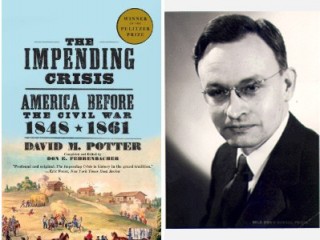
David M. Potter biography
Date of birth : 1910-12-06
Date of death : 1971-02-18
Birthplace : Augusta, Georgia
Nationality : American
Category : Famous Figures
Last modified : 2011-02-17
Credited as : Civil War historian, People of Plenty 1953,
The American historian David M. Potter was trained as a Civil War historian, but earned his reputation for his book People of Plenty (1953), which was one of the significant texts of the era. He wrote extensively on the American society, the American character, and historiography.
Following year. It was seven years, however, before he received his Ph.D. from Yale. He began his graduate study under Ulrich B. Phillips, a historian of the South, but completed work under Ralph H. Gabriel, an American intellectual historian. These two scholars influenced his choice of subjects for the rest of his life.
Potter began his teaching career as an instructor of history at the University of Mississippi in 1936. He taught there for two years before moving to Rice University. While in Texas he married his first wife, Ethelyn Henry, in 1939. He left Rice in 1942 to become master of Timothy Dwight College at Yale.
The reason for the summons to Yale was the publication of his dissertation under the title of Lincoln and His Party in the Secession Crisis (1942). The book achieved instant acclaim; Sir Denis Brogan characterized it as the best revised thesis since Arthur M. Schlesinger's. While at New Haven Potter divorced his wife in 1945; he remarried three years later to Mary Roberts. Potter's career continued its rapid advance in the 1940s. He became Harmsworth Professor and fellow of Queen's College, Oxford, in 1947, a singular honor for a scholar who was but 37 years old and who had written only one major book.
Not that Potter was unproductive in this period. In 1945 he edited Trail to California: The Overland Diary of Vincent Geiger and Wakeman Bryarly, and in 1948, along with J. H. Croushare, he edited A Union Officer in the Reconstruction, an account by John William De Forest. That same year he published The Lincoln Theme and American National Historiography. The following year he co-authored two books with T.G. Manning; they were Nationalism and Sectionalism in America and Government and the American Economy. In 1949 as well he became editor of the Yale Review, a post he held for two years.
In 1950 Potter became Coe Professor; in a mere eight years at Yale he had earned an endowed chair. That same year he gave the Walgreen Lectures at the University of Chicago. These lectures, published three years later as People of Plenty: Economic Abundance and the American Character, won Potter the reputation of being one of the best American historians of the time. The book employed insights from the social sciences, particularly anthropology, to argue that American productivity was both a cause and a result of the American character. The book expanded the Turnerian thesis and was a landmark book in American historiography.
Potter left Yale for an endowed chair at Stanford in 1961. During the 1950s and 1960s he wrote penetrating essays on American society, the American character, and historiography. These added to his fame as "one of the truly great interpreters of American history, " and he became a fellow of the American Academy of Arts and Sciences as well as a member of the American Philosophical Society. He did complete two books in the 1960s: Issues in American History: Views and Counterviews (1966) with Curtis R. Grant and, better known, The South and the Sectional Crisis (1968). He also continued to give lectures, presenting the Commonwealth Fund Lecture at University College, London, in 1963 and the Walter L. Fleming Lectures at Louisiana State University in 1968.
Potter died February 18, 1971, before he could finish the many projects he had set for himself. He was unable to deliver the presidential addresses for either the Organization of American Historians or the American Historical Association. His colleagues at Stanford did complete other works. Carl Degler and Don E. Fehrenbacher edited his Fleming Lectures, which were published as The South and the Concurrent Majority in 1972. Fehrenbacher put a number of Potter's articles together into a book, History and American Society (1973). In 1976 Fehrenbacher completed The Impending Crisis 1848-1861 (a volume in the New American Nation Series), which won a Pulitzer Prize, as well as Freedom and Its Limitation in American Life, a collection of essays.
The best evaluation of Potter's writings is by Sir Denis Brogan in Marcus Cunliffe and Robin W. Winks, editors, Pastmasters: Some Essays on American Historians (1969). Potter's historical ideas can also be found in an interview contained in John A. Garraty, editor, Interpreting American History: Conversations with Historians (1973). His work is mentioned briefly in John Higham, History: Professional Scholarship in America (1965).
















